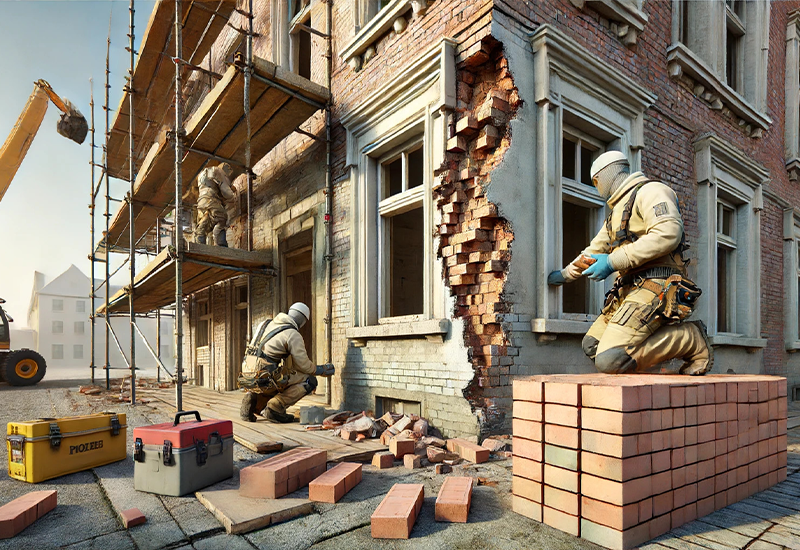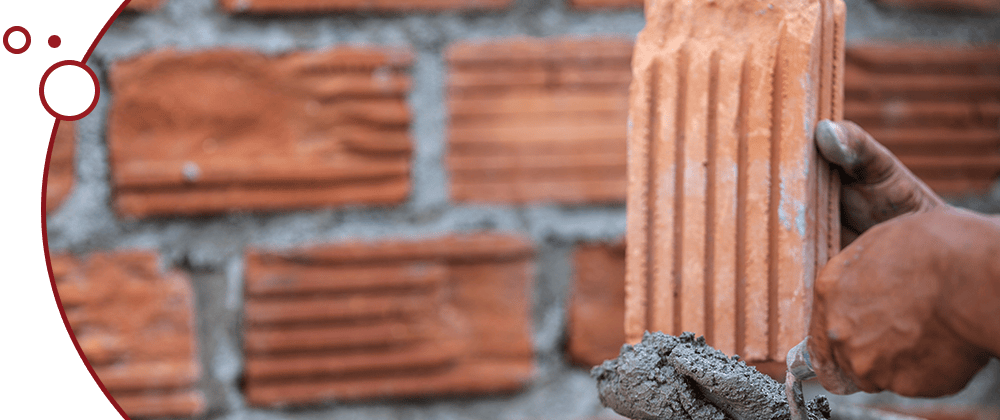
When it comes to maintaining the integrity and appearance of your home, brick repair is a critical aspect. Understanding the costs associated with brick repair can help homeowners budget effectively and make informed decisions. In this article, we delve into various factors that affect the cost of brick repair, offering a clear view of potential expenses.
Table of Contents
The Basics of Brick Repair
Brick repair addresses various damages to brick structures, ranging from minor aesthetic issues to significant structural concerns. These repairs can stem from natural aging, environmental factors like weather, or physical impacts. Typically, minor repairs might require simple repointing of mortar, which involves renewing the external part of mortar joints to ensure stability and extend the life of the masonry. More extensive damage may necessitate the replacement of bricks to maintain the wall’s integrity. This process ensures the continued safety and appearance of brick structures in a cost-effective manner.
Factors Influencing Brick Repair Costs
Understanding the factors that impact the cost of brick repair can help you plan better and potentially save money. Whether you’re dealing with minor wear and tear or major structural issues, several elements play crucial roles in determining the overall expense.
Type of Damage
- Minor Cracks and Chips: Small-scale damages like minor cracks and chips are typically the most straightforward to fix. These repairs usually involve simple patching techniques, where a masonry patching compound is used to fill the cracks or chips, restoring the surface integrity of the bricks. Because these repairs don’t require extensive labor or costly materials, they are generally the least expensive. It’s also a faster fix, which means less labor cost.
- Structural Damage: On the other hand, structural damage requires a more in-depth approach. If the integrity of the brick structure is compromised, not only does the aesthetic aspect need restoration, but the stability of the building might be at risk. This type of repair may involve removing and replacing entire sections of brickwork, which can be labor-intensive and costly. Such extensive repairs require careful assessment by professionals to ensure that the structure remains safe and stable.
Materials and Techniques
The materials and techniques used in brick repair significantly affect the cost. The type of brick and mortar needed for a repair project can vary based on the age of the building and the condition of the existing materials. For instance:
- Brick Matching: Matching the bricks can be expensive, especially if the original bricks are no longer manufactured or are of a unique type that isn’t readily available.
- Mortar Type: The type of mortar used is also critical. Historic buildings might need a particular kind of lime mortar, which can be more costly than the more commonly used cement mortars due to its specific mixing and curing requirements.
Moreover, specialized techniques such as tuckpointing or repointing also influence the costs. These techniques are not only labor-intensive but require a high level of craftsmanship to ensure that the new work matches the original in appearance and strength, which adds to the cost.
Labor Costs
The labor costs for brick repair can vary significantly depending on several factors:
- Location: In urban areas, where the cost of living and the general cost of services are higher, labor costs will be more substantial than in rural areas.
- Expertise of the Contractor: The skill level and experience of the contractor also play a significant role. Specialists who perform precision masonry work, particularly on historic or complex structures, generally charge more due to their expertise and the detailed nature of their work.
- Scope of the Project: The complexity and size of the project also affect labor costs. A larger or more complex repair job will require more time and possibly multiple masons, which increases overall labor costs.
By understanding these factors, homeowners can better navigate the process of brick repairs, ensuring they make informed decisions that balance cost with the necessity of the work required. This knowledge helps in discussing options with contractors and can lead to more effective budgeting for necessary repairs.
Average Costs of Brick Repair
Understanding the financial implications of brick repair projects is crucial for homeowners planning maintenance or renovations. The costs can vary widely based on the scale and nature of the repair needed. Here’s a breakdown of what you might expect to pay, ranging from small fixes to extensive repairs, including a helpful cost breakdown example in table format.
Small Repairs
For minor issues, such as small cracks or chips, the repair costs are generally more manageable. These repairs typically involve simple techniques such as filling cracks with a suitable filler or sealing small chips.
- Cost Range: You can expect to pay between $15 to $25 per square foot for such repairs. The lower end of the spectrum generally covers straightforward patching, while the higher end may involve more detailed color and texture matching to ensure the repair blends seamlessly with the existing brickwork.
Extensive Repairs
When it comes to more significant damages, such as those affecting structural integrity or larger areas of the wall, the costs increase correspondingly. These repairs are more complex and may require comprehensive work like removing and replacing damaged bricks, or even rebuilding sections of the wall.
- Cost Range: For extensive repairs, costs typically range from $25 to $45 per square foot. The final price can vary even more based on factors such as the rarity of the materials needed and the difficulty of the repair.
Cost Breakdown Example
Let’s consider a simple example to give you a clearer picture of how costs can add up in a typical brick repair project, where we account for both materials and labor:
| Item | Cost |
| Materials | $200 |
| Labor | $300 |
| Total Cost | $500 |
This table illustrates a basic scenario for moderate repairs, showing how the costs are distributed. Materials typically include costs for bricks, mortar, and any special sealants or treatments needed. Labor costs are calculated based on the hours needed to complete the job, which includes setup, repair, and cleanup time.
Explaining the Cost Factors
- Material Costs: These vary depending on the type of bricks and mortar used. Specialty materials or bricks that match historical or architectural standards can be more expensive.
- Labor Costs: Skilled labor is crucial for effective brick repair, especially for extensive damage. The cost can vary based on the contractor’s experience and the geographical area.
By understanding these cost components, homeowners can better plan their budgets and discuss options with repair professionals to ensure that the repairs are both effective and economical. Being informed helps you make the right decisions for maintaining the value and appearance of your property. Whether dealing with minor aesthetic issues or significant structural repairs, staying knowledgeable is key.
How to Budget for Brick Repair

Budgeting for brick repair is not just about accounting for the immediate costs. It also involves preparing for any unforeseen expenses that might arise during the repair process. Here’s how you can manage your finances effectively when planning for brick repairs:
Setting Aside a Contingency Fund
When planning your budget, it’s wise to include a contingency fund. This is extra money set aside to cover unexpected costs that can crop up during the repair process. For example, once repair work begins, you might discover damage more extensive than initially expected. You might also need special materials that weren’t considered at first.
- Recommended Size of Contingency Fund: It’s a good practice to add about 10% to 15% to your estimated repair costs to create this contingency fund. This buffer will help you manage any surprises without straining your finances too much.
Estimating Your Costs
- Assess the Damage: Start with a thorough assessment of the brick damage to understand the scope of the repairs needed. This can be done through a consultation with a professional mason or contractor.
- Get Multiple Quotes: Once you have a clear idea of what needs to be done, obtain quotes from several contractors. This will give you a range of prices and services from which you can choose the best option for your budget.
- Factor in All Costs: Make sure your budget includes all potential costs—materials, labor, and any additional fees that may apply, such as permits or inspections if required.
Monitoring Your Budget
- Keep Track of Expenses: As the repair progresses, keep a detailed record of all expenses. This will help you stay on top of your budget and adjust your contingency fund as needed.
- Review and Adjust: If you find that costs are exceeding your initial estimates, review the work done so far and discuss any budget concerns with your contractor. This might involve scaling back on some repairs or phasing the work to spread the cost over time.
By setting aside a contingency fund and carefully planning your budget, you can handle brick repairs without financial stress. Remember, maintaining the structural integrity and appearance of your home is a worthwhile investment, but it doesn’t have to break the bank. With careful planning and savvy financial management, you can ensure that your brick repairs are both effective and economical.
Choosing the Right Contractor
Selecting the right contractor is crucial for ensuring that your brick repair is done correctly and efficiently. The expertise of the contractor significantly influences the quality of the repairs and the overall durability of the work. Here are some steps and tips to help you find the right professional for the job:
Check for Licensing and Certification
Always start by verifying that the contractor is licensed and certified to perform masonry work. Licensing requirements vary by state, so it’s important to ensure that the contractor meets all local regulations. This not only ensures that they have the necessary skills and knowledge but also provides a level of security and trustworthiness.
Read Reviews and Check References
- Online Reviews: Look at reviews on platforms like Yelp, Angie’s List, and Google. Pay attention to both positive and negative reviews to get a balanced view of the contractor’s reputation and the quality of their work.
- References: Ask the contractor for references and follow up with them. Speaking to previous clients can give you insights into the contractor’s reliability, work ethic, and customer service.
Examine Their Portfolio
A contractor’s portfolio of completed projects can provide a visual confirmation of their craftsmanship and attention to detail. Reviewing before and after photos of previous brick repair projects can help you gauge whether their capabilities align with your project requirements.
Discuss Their Approach and Materials
When you meet with potential contractors, discuss the repair techniques they propose and the materials they plan to use. This conversation can give you an idea of their proficiency and their approach to brick repair. It’s important that they use materials that match the existing brickwork to maintain the aesthetic and structural integrity of your home.
Get a Written Estimate
- Detailed Quotes: Obtain a detailed estimate from each contractor you consider. This estimate should clearly outline the scope of work, the materials to be used, the timeline, and the total cost.
- Compare Quotes: Compare the quotes from different contractors to see which offers the best value. Remember, the cheapest option is not always the best—balance the cost with the quality of work and the contractor’s reputation.
Check for Warranties and Guarantees
A reputable contractor will offer a warranty or guarantee on their work. This shows that they stand behind the quality of their work and are willing to address any issues that may arise post-repair.
By taking these steps, you can confidently select a contractor who will perform the brick repair work to a high standard, ensuring long-lasting results and peace of mind. Remember, a good contractor not only provides quality craftsmanship but also fosters a professional and communicative relationship with their clients.
Conclusion:
In wrapping up our discussion on brick repair cost, it’s clear that various factors from materials to labor impact the overall expenses. If you’re looking for a professional contractor to handle your brick repair, ensuring quality and reliability, feel free to contact us at +(1) 917-477-9667. We’re here to provide skilled services that meet your specific needs, ensuring we restore your brickwork to its best condition.
FAQs:
Q: What is the typical brick repair cost for minor cracks?
A: The brick repair cost for minor cracks typically ranges from $15 to $25 per square foot, depending on the extent and location of the damage.
Q: How does the type of brick affect the brick repair cost?
A: The type of brick can significantly influence the brick repair cost. Specialty bricks that match the aesthetic and structural properties of your building may cost more.
Q: Can DIY efforts help reduce the brick repair cost?
A: While DIY can reduce the brick repair cost for very minor issues, experts recommend professional repairs for more extensive or structural damage. This ensures safety and quality.
Q: What should I include in my budget for brick repair cost?
A: When budgeting for brick repair cost, include the cost of materials, labor, and a contingency fund for unexpected complications.
Q: Why might my final brick repair cost exceed the initial quote?
A: Unexpected issues discovered during the repair process may cause your final brick repair cost to exceed the initial quote. These issues can include hidden structural damage or the need for specialized materials.


